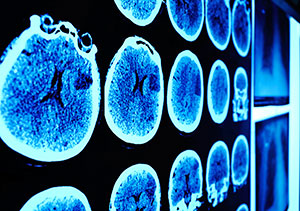Vascular brain injury is evident in people in their 40s
March 28, 2016

The large study involved approximately 1,900 diverse participants in the Framingham Heart Study, who underwent brain magnetic resonance imaging (MRI), as well as arterial tonometry.
A large, multicenter study led by the UC Davis School of Medicine for the first time has shown that people as young as their 40s have stiffening of the arteries that is associated with subtle structural damage to the brain that is implicated in cognitive decline and Alzheimer’s disease later in life.
A collaboration of UC Davis, the Framingham Heart Study and Boston University, among others, the study found that, among young healthy adults, higher aortic “stiffness” was associated with reduced white matter volume and decreased integrity of the gray matter, and in ages much younger than previously described.
“Effects of Arterial Stiffness on Brain Integrity in Young Adults from the Framingham Heart Study,” is published online today in the American Heart Association journal Stroke.
“This study shows for the first time that increasing arterial stiffness is detrimental to the brain, and that increasing stiffness and brain injury begin in early middle life, before we commonly think of prevalent diseases such as atherosclerosis, coronary artery disease or stroke having an impact,” said Pauline Maillard, UC Davis Department of Neurology and Center for Neuroscience and the study’s lead author.
“These results may be a new avenue of treatment to sustain brain health,” she said.
The study also noted that elevated arterial stiffness is the earliest manifestation of systolic hypertension.
“Measures of arterial stiffness may actually be a better measure of vascular health, and should be identified, treated and monitored throughout the lifespan,” Maillard said.
The large study involved approximately 1,900 diverse participants in the Framingham Heart Study, who underwent brain magnetic resonance imaging (MRI), as well as arterial tonometry.
The tests measured the force of arterial blood flow, the carotid femoral pulse wave velocity or CFPWV — the reference standard for noninvasive measurement of aortic stiffness — and its association with subtle injury to the brain’s white and gray matter. The research found that increased CFPWV was associated with greater injury to the brain.
The reasons this is so are complex, and more study is needed, Maillard said. However, with age high blood pressure causes the arteries to stiffen, further increasing blood pressure as well as increasing calcium and collagen deposits, which promotes atrophy, inflammation and further stiffening, decreasing blood flow to vital organs including the brain and promoting brain atrophy.
“Our results emphasize the need for primary and secondary prevention of vascular stiffness and remodeling as a way to protect brain health,” early in life, Maillard said.
Other study authors are Gary F. Mitchell, Cardiovascular Engineering, Inc.; Jayandra J. Himali, the Framingham Heart Study and Boston University School of Medicine; Alexa Beiser, the Framingham Heart Study, Boston University and the Boston University School of Public Health; Connie W. Tsao, Beth Israel Deaconess Medical Center and Harvard Medical School; Matthew P. Pase, the Framingham Heart Study, Boston University School of Medicine and Swinburne University of Technology, Australia; Claudia L. Satizabal, the Framingham Heart Study and Boston University School of Medicine; Ramachandran S. Vasan, Boston University School of Medicine; Sudha Seshadri, the Framingham Heart Study and Boston University School of Medicine; and Charles DeCarli, Imaging of Dementia and Aging (IDeA) Laboratory and Department of Neurology UC Davis.
The study was funded by National Institutes of Health (NIH) grants R01 AG03304 and P30 AG010129, K23 LH118529; the Framingham Heart Study; National Heart Blood and Lung Institute (NHLBI) contracts N01-HC-25195 and HHSN268201500001; by the Boston University School of Medicine; and by HL076784; G028321; HL070100; HL06040; HL080124; HL071039; HL077447; HL107385; and 2-K24-HL04334.
The UC Davis Alzheimer's Disease Center is one of only 27 research centers designated by the National Institutes of Health's National Institute on Aging. The center's goal is to translate research advances into improved diagnosis and treatment for patients while focusing on the long-term goal of finding a way to prevent or cure Alzheimer's disease. Also funded by the state of California, the center allows researchers to study the effects of the disease on a uniquely diverse population. For more information, visit alzheimer.ucdavis.edu.

